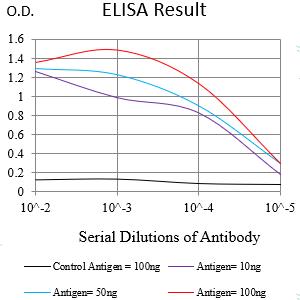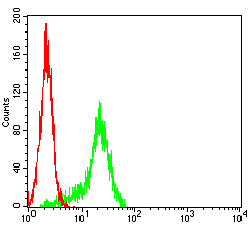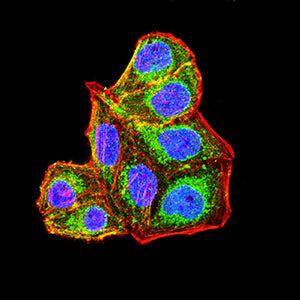


| WB | 咨询技术 | Human,Mouse,Rat |
| IF | 咨询技术 | Human,Mouse,Rat |
| IHC | 咨询技术 | Human,Mouse,Rat |
| ICC | 1/25 - 1/200 | Human,Mouse,Rat |
| FCM | 1/200 - 1/400 | Human,Mouse,Rat |
| Elisa | 1/10000 | Human,Mouse,Rat |
| Aliases | P21; CIP1; SDI1; WAF1; CAP20; CDKN1; MDA-6; p21CIP1 |
| Entrez GeneID | 1026 |
| clone | 2D4E3E4 |
| WB Predicted band size | 18.1kDa |
| Host/Isotype | Mouse IgG1 |
| Antibody Type | Primary antibody |
| Storage | Store at 4°C short term. Aliquot and store at -20°C long term. Avoid freeze/thaw cycles. |
| Species Reactivity | Human |
| Immunogen | Purified recombinant fragment of human CDKN1A (AA: 1-164) expressed in E. Coli. |
| Formulation | Purified antibody in PBS with 0.05% sodium azide |
+ +
以下是与CDKN1A(p21)抗体相关的3篇文献示例,涵盖不同研究场景:
---
1. **文献名称**:*CDKN1A/p21 regulates TNF-mediated apoptosis in human monocytes through STAT3 signaling*
**作者**:Smith et al. (2018)
**摘要**:研究通过Western blot和流式细胞术,使用CDKN1A抗体验证TNF-α处理后人单核细胞中p21蛋白表达上调,揭示其通过STAT3通路抑制细胞凋亡的机制。
---
2. **文献名称**:*Immunohistochemical analysis of p21 expression in colorectal cancer prognosis*
**作者**:García-Sánchez et al. (2015)
**摘要**:利用CDKN1A抗体对结直肠癌组织进行免疫组化染色,发现p21低表达与患者生存率下降显著相关,提示其作为预后生物标志物的潜力。
---
3. **文献名称**:*Oxidative stress induces p21-dependent cell cycle arrest via CDKN1A transcriptional activation*
**作者**:Chen & Wang (2020)
**摘要**:通过ChIP实验结合CDKN1A抗体,证实氧化应激下转录因子FOXO4直接结合p21启动子,介导细胞周期停滞,为抗氧化治疗的靶点提供依据。
---
每篇文献均展示了CDKN1A抗体在不同实验(Western blot、免疫组化、ChIP)中的应用,研究领域涉及凋亡调控、癌症预后及氧化应激响应。
The CDKN1A antibody is a crucial tool in molecular and cellular biology research, targeting the cyclin-dependent kinase inhibitor 1A (CDKN1A), also known as p21 or Cip1/Waf1. This protein plays a pivotal role in regulating the cell cycle by inhibiting cyclin-dependent kinase (CDK) complexes, thereby inducing cell cycle arrest in response to DNA damage or stress. CDKN1A is transcriptionally activated by the tumor suppressor p53. linking it to critical pathways in apoptosis, senescence, and tumor suppression.
Antibodies against CDKN1A are widely used to study its expression, localization, and function in various biological contexts, including cancer, aging, and cellular stress responses. They enable detection via techniques like Western blotting, immunohistochemistry (IHC), immunofluorescence (IF), and flow cytometry. Researchers utilize these antibodies to explore how CDKN1A modulates cell proliferation, differentiation, and therapeutic resistance, particularly in oncology. For example, altered p21 expression is associated with tumor progression and chemotherapy outcomes.
Validating CDKN1A antibodies requires attention to specificity, often confirmed through knockout controls or siRNA knockdown. Cross-reactivity with related proteins (e.g., p27 or p57) should be ruled out. These reagents are essential for elucidating CDKN1A's dual roles as both a tumor suppressor and a potential promoter of cell survival in certain contexts, highlighting its complex influence on cellular fate decisions.
×